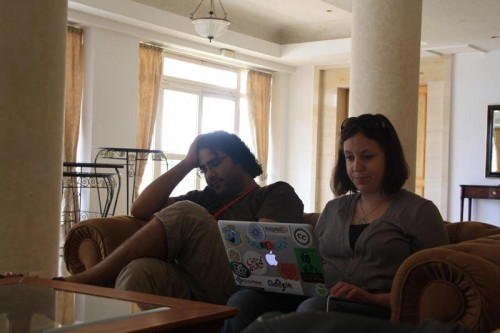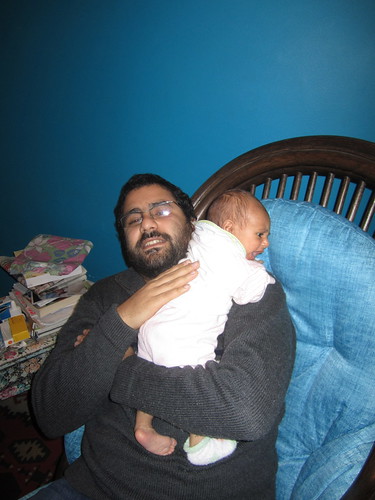
I don’t really remember meeting Alaa. I just remember that, from the first moment I saw him, how obvious his presence was. We were sitting in a room in Budapest talking to a group of academics about something or other, something about activism, and everything they said was wrong, in Alaa’s view. He raised his voice across the table, and I was struck by his boldness.
Sometime a couple of years later, in 2010, we became friends. I know this from the abundance of encrypted chat logs that sit in my email, when we started to talk once or twice a week. This was before the revolution, when he and Manal were living in South Africa. From the snippets I can piece together from memory and those rare unencrypted logs, I recall him admonishing me for not doing enough on X, chiding me gently for not speaking up on Y. One of those blanks was crypto itself. After one of those small but typical annoyances that come from using OTR, he said “OTR is a bit too demanding, but encryption tools typically are.” I replied, “I need to start getting better about using them.” “Yep,” was his response, and he was right. He would prove that.
When the revolution started, he was still in South Africa and could still reach his family in Cairo, despite the Internet blackout. I was in freezing Boston, and by virtue of my job at the Berkman Center for Internet & Society, I began receiving press calls – the New York Times, NPR, Al Jazeera. I knew how Egyptians had used Facebook and Twitter to organize before, but I couldn’t reach anyone on the ground. Alaa gave me names, including his sister Mona’s, which I in turn gave to press, connecting them with the rare person who still had a means of connecting out. He filled me in, I repeated his analysis to press. He didn’t want to be the center of attention then. He wasn’t there.

For nearly a week before he arrived, I would come home each day to find another enormous package from Amazon. There was a stroller (“all-terrain 4WD” as we later joked), countless books, and a few pretty cool toys that we definitely played with before Khaled did. The story of what happens next is known: When Alaa arrived, he already knew what would happen when he went home. He gave an incredible talk, went to the Occupy protests in Oakland, and hung out with my friends. Then he got on a plane and went straight to prison. Do not collect, do not pass go.

I visited Cairo for the first time not long after Khaled was born. He was tiny, fragile, and I stood helpless while Manal bathed him, already so obviously a mother. This was the height of autotune in Cairo and at some point after midnight, parents delirious from the beautiful lack of sleep that comes with having a newborn, we recorded Khaled’s cries and ran them through autotune, stifling manic laughter so as not to wake the baby.
The last time I saw Alaa was in Cairo. He picked me up across town at my hotel, and we sat in crazy Cairene traffic for three hours, the first time I’d ever seen him drive. I had brought a tricycle for Khaled and a fresh EFF shirt for Alaa at his request, and when we arrived Manal and I caught up while Alaa put the thing together, scrambling for its plastic parts. Later, the three of us went out with some of their friends. I listened quietly while they talked politics and revolution. Manal kept chiding them to speak English, Alaa remarked that by now I should be able to understand. I did, only a few words getting lost here and there. We drank tea until it got cold and they drove me back to Heliopolis.
These friendships come in fragments, but they are sometimes the best we have. And in this case, despite the fact the he is only (and exactly) six months my senior, the friend has also been one of my most important teachers, reminding me to take risks and not being afraid to tell me when I’m not going far enough, not doing enough. Chatting recently with another friend, who suggested that perhaps surrounding myself with perfectionists and radicals has damaged my own thought processes a little, I relented, but when I think about all that I have learned and all that I have been taught, I have no regrets.
I’ve said it to reporters so many times that it’s almost lost its meaning, but I’ll say it again: Alaa is in prison not because he committed a crime, not because he said too much, but because his very existence poses a threat to the state. Those who are bold, those who do not relent, will always threaten the terrified and ultimately weak state which must, to survive, squash its opponents like flies. But Alaa will not allow himself to be crushed like that, I know.
There is little more I can say that hasn’t been or wouldn’t be better said by Egyptians, those who fought these battles on the street while I merely watched, an observer with a few good friends on the ground. But the one thing I know is that we must not give up. Alaa hasn’t, and we cannot.
Inspired by Omar Robert Hamilton and Alia Mossallam, Belal Fadl, and Lina Attalah who have written their own beautiful pieces about our shared friend.
5 replies on “On Alaa, learning, and the struggle”
[…] tens of protests over the past 3 years I only met Alaa once. After reading the brilliant piece by Jillian York on Alaa it made me regret not making the time to meet up with him for an extended period of time even more […]
حقوق الإنسان، هي الحقوق والحريات المستحقة لكل شخص لمجرد كونه إنسانا. ويستند مفهوم حقوق الإنسان على الإقرار بما لجميع أفراد الأسرة البشرية من قيمة وكرامة أصيلة فيهم، فهم يستحقون التمتع بحريات أساسية معينة. وبإقرار هذه الحريات فإن المرء يستطيع أن يتمتع بالأمن والأمان، ويصبح قادراً على اتخاذ القرارات التي تنظم حياته.
حقوق الإنسان ليس لها تعريف محدد بل هناك العديد من التعاريف التي قد يختلف مفهومها من مجتمع إلى آخر أو من ثقافة إلى أخرى، لان مفهوم حقوق الإنسان أو نوع هذه الحقوق يرتبطان بالأساس بالتصور الذي نتصور به الإنسان، لذلك سوف نستعرض مجموعة من التعاريف لتحديد هذا المصطلح: يعرفها رينية كاسان وهو أحد واضعي الإعلان العالمي لحقوق الإنسان بأنها (فرع خاص من الفروع الاجتماعية يختص بدراسة العلاقات بين الناس استناداً إلى كرامة الإنسان وتحديد الحقوق والرخص الضرورية لازدهار شخصية كل كائن أنساني، ويرى البعض ان حقوق الإنسان (تمثل رزمة منطقية متضاربة من الحقوق والحقوق المدعاة)، أما كارل فاساك فيعرفها بانها (علم يهم كل شخص ولا سيما الإنسان العامل الذي يعيش في اطار دولة معينة، والذي إذا ما كان متهم بخرق القانون أو ضحية حالة حرب، يجب أن يستفيد من حماية القانون الوطني والدولي، وان تكون حقوقه وخاصة الحق في المساواة مطابقة لضرورات المحافظة على النظام العام)، في حين يراها الفرنسي ايف ماديو بأنها (دراسة الحقوق الشخصية المعرف بها وطنياً ودولياً والتي في ظل حضارة معينة تضمن الجمع بين تأكيد الكرامة الإنسانية وحمايتها من جهة والمحافظة على النظام العام من جهة أخرى). اما الفقيه الهنكاري (أيمرزابو) فيذهب إلى (ان حقوق الإنسان تشكل مزيجاً من القانون الدستوري والدولي مهمتها الدفاع بصورة مباشرة ومنظمة قانون عن حقوق الشخص الإنساني ضد انحرافات السلطة الواقعة في الأجهزة الدولية، وأن تنمو بصورة متوازنة معها الشروط الإنسانية للحياة والتنمية المتعددة الأبعاد للشخصية الإنسانية. وجميع التعريفات الآنفة الذكر تعكس وجهة نظر الكتاب الأجانب، أما فيما يخص الكتاب العرب فان محمد عبد الملك متوكل يعطي تعريفاً شاملا وواسعا إذ يعرفها بأنها(مجموعة الحقوق والمطالب الواجبة الوفاء لكل البشر على قدم المساواة دونما تمييز بينهم)، أما رضوان زيادة فيذهب إلى القول بان حقوق الإنسان (هي الحقوق التي تكُفل للكائن البشري والمرتبطة بطبيعته كحقه في الحياة والمساواة وغير ذلك من الحقوق المتعلقة بذات الطبيعة البشرية التي ذكرتها المواثيق والإعلانات العالمية). ويرى الأستاذ باسيل يوسف ان حقوق الإنسان (تمثل تعبيراً عن تراكم الاتجاهات الفلسفية والعقائد والأديان عبر التاريخ لتجسد قيم إنسانية عليا تتناول الإنسان أينما وجد دون أي تمييز بين البشر لا سيما الحقوق الأساسية التي تمثل ديمومة وبقاء الإنسان وحريته). أما محمد المجذوب فيعرفها بانها (مجموعة الحقوق الطبيعية التي يمتلكها الإنسان واللصيقة بطبيعته والتي تظل موجودة وان لم يتم الاعتراف بها، بل أكثر من ذلك حتى ولو انتهكت من قبل سلطة ما). اما الأمم المتحدة فقد عرفت حقوق الإنسان بانها(ضمانات قانونية عالمية لحماية الأفراد والجماعات من اجراءات الحكومات التي تمس الحريات الأساسية والكرامة الإنسانية، ويلزم قانون حقوق الإنسان الحكومات ببعض الأشياء ويمنعها من القيام باشياء أخرى)، أي ان رؤية المنظمة الدولية لحقوق الإنسان تقوم على أساس انها حقوق أصيلة في طبيعة الإنسان والتي بدونها لا يستطيع العيش كإنسا
حقوق الإنسان، هي الحقوق والحريات المستحقة لكل شخص لمجرد كونه إنسانا. ويستند مفهوم حقوق الإنسان على الإقرار بما لجميع أفراد الأسرة البشرية من قيمة وكرامة أصيلة فيهم، فهم يستحقون التمتع بحريات أساسية معينة. وبإقرار هذه الحريات فإن المرء يستطيع أن يتمتع بالأمن والأمان، ويصبح قادراً على اتخاذ القرارات التي تنظم حياته.
حقوق الإنسان ليس لها تعريف محدد بل هناك العديد من التعاريف التي قد يختلف مفهومها من مجتمع إلى آخر
[…] From Jillian York: […]
[…] per chiedere alle autorità egiziane la liberazione dei colleghi incarcerati. Qui Lina Attalah, e qui Jillian C. York, che scrivono entrambe di Alaa. Qui il racconto dell’arresto di Alaa scritto su Facebook da […]